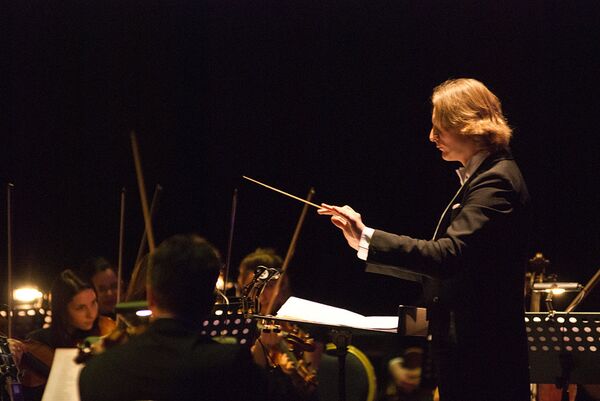Music fans have long flocked to hear – or shuddered at the thought of – the songs of such bands as Metallica, Queen or The Beatles played by the orchestra, but now classic Soviet rock has got the classical treatment.
Kino, one of the biggest Soviet bands of the 1980s, may not seem a natural fit for a symphonic orchestra, but the organizers and audience of Thursday's show at one of Moscow's largest concert halls would disagree.
Three dozen songs by the band, whose name means "cinema," written in the last decade of the Soviet epoch, have been rearranged for orchestra and were presented to the public at the Crocus City Hall to the northwest of Moscow on Thursday.
"We understood that it's time to do something similar in our country," said Yury Dontsov, the concert organizer, reflecting on orchestral versions of Western rock classics.
"Of course, this is a very unusual and risky project, and it can hardly be called a commercial one. This is rather a contribution to art by our company."
Although 20 years have passed since the band's iconic leader, Viktor Tsoi, died in a car accident, there is an enduring popularity to Kino's songs, with their simple lyrics that were sometimes naive but always thoughtful. Tsoi's words reflected his personal feelings and emotions, but they often acquired political interpretation at a time when fresh air from the West had already reached the Soviet public, bringing nearer the collapse of the communist empire.
"We are awaiting changes!" Tsoi was singing on the eve of perestroika.
"Although many things have changed in two decades, these words are still relevant and will always remain so," said Andrei, a 28-year-old Kino fan.
Lena, the wife of a 35-year-old businessman, says her husband was a very big fan of Kino when he was younger. "The walls of his room were all covered with Kino's posters. Today, we came here to recall our youth."
Before the concert, former Kino guitarist Georgy Kasparyan drinks tea with milk in a nearby cafe.
"I believe that Tsoi's songs were not tied to the moment. They are timeless," Kasparyan, dressed in black, says with his calm, relaxed voice between puffs on a cigarette. "Sometimes they are full of teenage protest, sometimes they are provocative, even hooligan, but always witty. People of different views, psychologies, life philosophies and characters each can extract different things from a single song."
In 1989, when Soviet rock music was just emerging from the underground into the light, Tsoi and Kasparyan performed once in the United States. They came there for the premiere of the cult Soviet movie Igla, in which Tsoi played the boyfriend of a drug-addicted woman who was killed by drug mafia while trying to help her beat her addiction. Tsoi's friends recall that the show was attended by many Hollywood stars, and that the songs performed by Tsoi and Kasparyan after the show made a deep impression on the U.S. public, even though they could not understand the lyrics.
Kasparyan explains their success and Americans' interest in Soviet rock: "You know, perestroika, the end of the nuclear threat - they were all very happy, they applauded."
Twenty years after perestroika, Kino fans still gather in front of the so-called Wall of Viktor Tsoi, an informal Moscow landmark on the central Arbat pedestrian street. There, they honor the Last Hero, as they call Kino's leader in a reference to one of his songs. Many of those who bring candles and flowers to the wall every year on August 15, the anniversary of Tsoi's death, are teenagers whose only experiences of the underground rock concerts of the 1980s and empty shops of the early 1990s are the stories of their parents and grandparents.
Kasparyan disagrees with the idea that Tsoi's image is too heroized, like those of Kurt Kobain or Elvis Pressley, and that if he had not died at the peak of his career at 28, his music might not be so popular now.
"Do you think that if Mick Jagger had died, the Rolling Stones would have been more popular?" he asks.
Although the vast Crocus City Hall was not sold out, Kino's music can clearly still draw a crowd. The organizers say they may follow the one-off concert with an appearance at next summer's Nashestviye rock festival.
"Death is worthy of living, and love is worthy of waiting," said Igor Vdovin, who wrote the orchestration, repeating one of his favorite lines from Tsoi's songs.
MOSCOW, December 17 (RIA Novosti correspondent Maria Kuchma)


